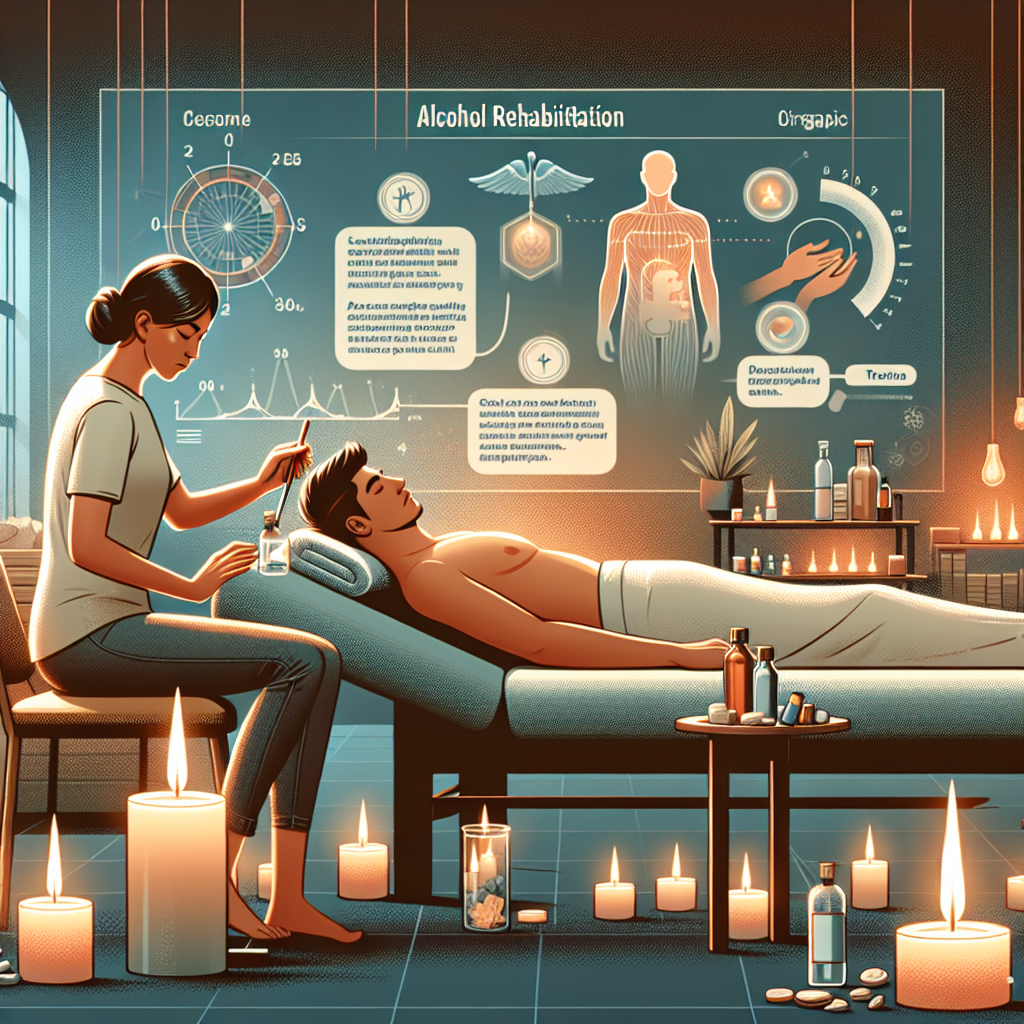-
Table of Contents

“Holistic Therapies: Healing Mind, Body, and Spirit in Alcohol Rehab”
Introduction
Holistic therapies in alcohol rehab offer a comprehensive approach to recovery that addresses the physical, emotional, mental, and spiritual aspects of addiction. Unlike traditional methods that primarily focus on detoxification and counseling, holistic therapies incorporate a variety of practices such as yoga, meditation, acupuncture, and nutritional counseling. These therapies aim to restore balance and promote overall well-being, helping individuals to not only overcome their addiction but also to build a healthier, more fulfilling life. By treating the whole person rather than just the symptoms of addiction, holistic therapies can enhance the effectiveness of rehab programs, reduce the risk of relapse, and support long-term recovery.
The Role Of Holistic Therapies In Enhancing Recovery Outcomes In Alcohol Rehab
Holistic therapies have increasingly become a cornerstone in the realm of alcohol rehabilitation, offering a comprehensive approach that addresses not just the physical aspects of addiction but also the emotional, mental, and spiritual dimensions. These therapies, which include practices such as yoga, meditation, acupuncture, and art therapy, aim to treat the whole person rather than just the symptoms of addiction. By integrating holistic therapies into traditional rehab programs, individuals can experience a more balanced and sustainable recovery process.
One of the primary benefits of holistic therapies in alcohol rehab is their ability to reduce stress and anxiety, which are often significant triggers for relapse. For instance, meditation and mindfulness practices help individuals develop a greater sense of inner peace and emotional stability. These techniques teach people how to stay present in the moment, reducing the mental clutter that can lead to overwhelming feelings of stress. As a result, individuals are better equipped to handle the challenges of recovery without resorting to alcohol as a coping mechanism.
Moreover, holistic therapies can enhance physical well-being, which is crucial for individuals recovering from alcohol addiction. Yoga, for example, not only improves physical strength and flexibility but also promotes mental clarity and emotional resilience. The physical activity involved in yoga releases endorphins, which are natural mood lifters, thereby helping to combat the depressive states that often accompany withdrawal and early recovery. Similarly, acupuncture has been shown to alleviate withdrawal symptoms and reduce cravings, making the detoxification process more manageable.
In addition to physical and emotional benefits, holistic therapies also foster a sense of community and connection, which is vital for long-term recovery. Group activities such as art therapy or group meditation sessions create a supportive environment where individuals can share their experiences and learn from one another. This sense of belonging can be incredibly empowering, helping individuals feel less isolated and more understood. The bonds formed in these settings often extend beyond the rehab program, providing a network of support that can be relied upon during challenging times.
Furthermore, holistic therapies encourage self-exploration and personal growth, which are essential components of recovery. Practices like journaling or creative arts allow individuals to express their thoughts and emotions in a non-judgmental space. This self-expression can lead to profound insights and a deeper understanding of the underlying issues that contribute to addiction. By addressing these root causes, individuals are more likely to achieve lasting recovery and personal transformation.
Another significant advantage of holistic therapies is their ability to instill a sense of purpose and meaning in life. Many people struggling with addiction feel a profound sense of emptiness or lack of direction. Holistic practices such as spiritual counseling or nature therapy can help individuals reconnect with their inner selves and the world around them. This renewed sense of purpose can be a powerful motivator, driving individuals to stay committed to their recovery journey.
In conclusion, the integration of holistic therapies in alcohol rehab offers a multifaceted approach that enhances recovery outcomes. By addressing the physical, emotional, mental, and spiritual aspects of addiction, these therapies provide a more comprehensive and sustainable path to sobriety. The stress reduction, physical well-being, sense of community, personal growth, and renewed purpose that holistic therapies offer can significantly improve the quality of life for individuals in recovery. As more rehab programs recognize the value of these therapies, the potential for successful, long-term recovery continues to grow, offering hope and inspiration to those on the path to sobriety.
How Holistic Therapies Support Emotional And Physical Healing In Alcohol Rehab
Holistic therapies have increasingly become a cornerstone in the realm of alcohol rehabilitation, offering a comprehensive approach that addresses both emotional and physical healing. Unlike traditional methods that often focus solely on the physical aspects of addiction, holistic therapies aim to treat the individual as a whole, encompassing mind, body, and spirit. This integrative approach not only aids in detoxification but also fosters long-term recovery by promoting overall well-being.
One of the primary benefits of holistic therapies in alcohol rehab is their ability to support emotional healing. Alcohol addiction often stems from deep-seated emotional issues such as trauma, anxiety, or depression. Traditional treatments may not always delve into these underlying problems, leaving individuals vulnerable to relapse. Holistic therapies, however, offer various techniques like mindfulness meditation, yoga, and art therapy that help individuals explore and process their emotions in a safe and supportive environment. These practices encourage self-awareness and emotional resilience, empowering individuals to confront and manage their feelings without resorting to alcohol.
In addition to emotional healing, holistic therapies also play a crucial role in physical recovery. Alcohol abuse takes a significant toll on the body, leading to a range of health issues such as liver damage, cardiovascular problems, and weakened immune function. Holistic treatments like acupuncture, massage therapy, and nutritional counseling aim to restore physical health by promoting detoxification, improving circulation, and enhancing the body’s natural healing processes. For instance, acupuncture can help alleviate withdrawal symptoms and reduce cravings, while massage therapy can relieve stress and improve sleep quality. Nutritional counseling ensures that individuals receive the essential nutrients needed to repair and rejuvenate their bodies, laying a strong foundation for sustained recovery.
Moreover, holistic therapies foster a sense of community and connection, which is vital for emotional and physical healing. Group activities such as group meditation sessions, outdoor excursions, and support circles create a sense of belonging and mutual support. These communal experiences help individuals realize that they are not alone in their journey, reducing feelings of isolation and promoting a sense of shared purpose. This collective support can be incredibly motivating, encouraging individuals to stay committed to their recovery goals.
Furthermore, the holistic approach emphasizes the importance of lifestyle changes that support long-term sobriety. Techniques such as stress management, time management, and goal setting are integral components of holistic therapies. By equipping individuals with practical skills to navigate daily challenges, these therapies help them build a balanced and fulfilling life free from the grip of alcohol. For example, learning effective stress management techniques can prevent the urge to turn to alcohol during difficult times, while setting achievable goals can provide a sense of direction and accomplishment.
In conclusion, the benefits of holistic therapies in alcohol rehab are manifold, offering a well-rounded approach that supports both emotional and physical healing. By addressing the root causes of addiction and promoting overall well-being, these therapies pave the way for lasting recovery. The integrative nature of holistic treatments not only aids in detoxification but also fosters emotional resilience, physical health, and a sense of community. As more individuals and treatment centers recognize the value of this comprehensive approach, holistic therapies are poised to play an increasingly vital role in the journey toward sobriety and a healthier, more fulfilling life.
Q&A
1. **Question:** How do holistic therapies support mental health in alcohol rehab?
**Answer:** Holistic therapies, such as meditation and yoga, support mental health in alcohol rehab by reducing stress, improving emotional regulation, and enhancing overall mental well-being, which can aid in the recovery process.
2. **Question:** What role does nutrition play in holistic therapies for alcohol rehab?
**Answer:** Nutrition plays a crucial role in holistic therapies for alcohol rehab by helping to restore physical health, improve mood, and support brain function, which can be compromised by prolonged alcohol abuse.
Conclusion
Holistic therapies in alcohol rehab offer numerous benefits, including addressing the physical, emotional, and spiritual aspects of addiction. These therapies, such as yoga, meditation, acupuncture, and nutritional counseling, promote overall well-being and help individuals develop healthier coping mechanisms. By treating the whole person rather than just the addiction, holistic approaches can lead to more sustainable recovery outcomes, reduce the risk of relapse, and improve the quality of life for those in recovery.



